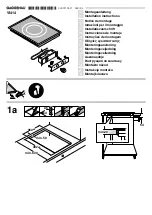
19
Boil overs, melts,
and hot sugary
spills on
the glass
Remove these immediately with a fish
slice, palette knife or razor blade
scraper suitable for Induction glass
cooktops, but beware of hot cooking
zone surfaces:
1. Switch the power to the cooktop off
at the wall.
2. Hold the blade or utensil at a 30°
angle and scrape the soiling or spill
to a cool area of the cooktop.
3. Clean the soiling or spill up with a
dish cloth or paper towel.
4. Follow steps 2 to 4 for ‘Everyday
soiling on glass’ above.
• Remove stains left by melts and
sugary food or spillovers as soon
as possible. If left to cool on the
glass, they may be difficult to
remove or even permanently
damage the glass surface.
• Cut hazard: when the safety cover
is retracted, the blade in a scraper
is razor-sharp. Use with extreme
care and always store safely and
out of reach of children.
Spillovers on the
touch controls
1. Switch the power to the cooktop off.
2. Soak up the spill
3. Wipe the touch control area with a
clean damp sponge or cloth.
4. Wipe the area completely dry
with a paper towel.
5. Switch the power to the cooktop
back on.
• The cooktop may beep and turn
itself off, and the touch controls
may not function while there is
liquid on them. Make sure you wipe the
touch control area dry before turning the
cooktop back on.
7. Hints and Tips
Problem
Possible causes
What to do
The induction hob
cannot be turned on.
No power.
Make sure the induction hob is
connected to the power supply
and that it is switched on.
Check whether there is a power
outage in your home or area. If
you’ve checked everything and the
problem persists, call a qualified
technician.
The touch controls are
unresponsive.
The controls are locked.
Unlock the controls. See section
‘Using your induction cooktop’ for
instructions.
The touch controls are
difficult to operate.
There may be a slight film of
water over the controls or you
may be using the tip of your
finger when touching the
controls.
Make sure the touch control area is dry
and use the ball of your finger when
touching the controls.
The glass is being
scratched.
Rough-edged cookware.
Unsuitable, abrasive scourer or
cleaning products being used.
Use cookware with flat and smooth
bases. See ‘Choosing the right
cookware’.
See ‘Care and cleaning’.
Some pans make
crackling or clicking
noises.
This may be caused by the
construction of your cookware
(layers of different metals
vibrating differently).
This is normal for cookware and
does not indicate a fault.
















































